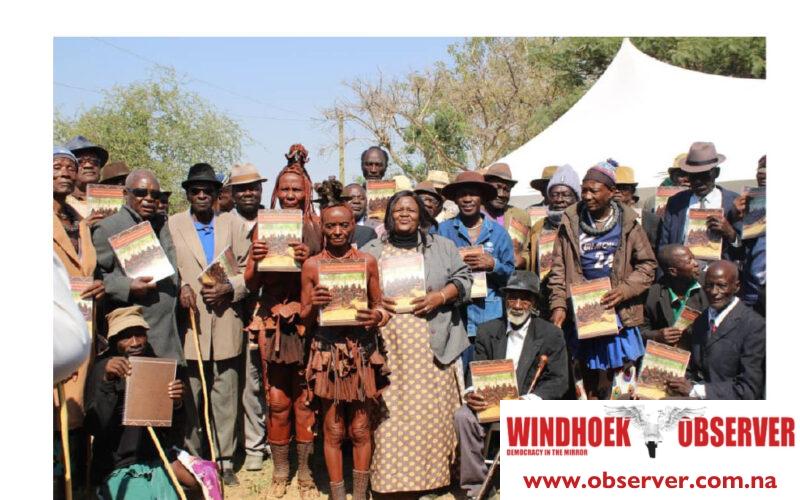Niël Terblanché
The OvaHerero peoples of Kaokoland, who live in areas spanning both Namibia and Angola, celebrated a historic milestone this week with the launch of their first written Biocultural Community Protocol (BCP).
The document, unveiled in Opuwo, captures the rich history, cultural practices, and traditions of the OvaHerero community, marking a significant step towards preserving and protecting their heritage.
More than 200 community members from the Kunene region in Namibia and the Cunene region in Angola gathered in Opuwo on Tuesday to commemorate the occasion.
The BCP is the result of four years of extensive community engagement and collaboration, supported by Natural Justice and International Rivers.
A second event is scheduled to take place in Windhoek later this week, with attendance expected from government officials and civil society organisations.
The BCP serves as a comprehensive community document, providing a roadmap for understanding OvaHerero history and traditional practices.
It outlines the protocols and cultural practices that have guided the OvaHerero of Kaokoland to use natural resources and indigenous knowledge systems in a sustainable manner.
The document also articulates the community’s vision for the future and details the challenges they currently face.
It aims to safeguard their traditional knowledge and assert the rights of the OvaHerero people in both Namibia and Angola.
Alphons Kahuhu Koruhama, an OvaHerero researcher, expressed the community’s pride in the launch.
“Today is a special day for us to see our dream of this document come to life. It’s a historical moment to be the first indigenous community in Namibia to have developed a BCP,” he said.
He added that earlier studies on these communities had not produced any noticeable outcomes.
“This is the only research that has been conducted, by the community and for the community, that has seen any tangible results—in the form of a document that we will be able to use to address our challenges and to protect, promote, and preserve our indigenous knowledge,” he said.
Motjinduika Mutambo, a BCP custodian committee member from the Ombuku Community, spoke about the challenges their communities face.
“While the country is free and we have independence, our communities do not have a system of governance. We don’t have protocols in writing; we don’t have a form of constitution to govern ourselves. For that reason, the other community members, the other traditions and cultures different from ours in the same independent country, ignore us, they don’t include us in anything,” she said.
Mutambo stressed the importance of the BCP in giving the OvaHerero community a voice and a means to ensure their traditions and rights are respected.
The protocol aims to bring all stakeholders together to understand and support the community’s aspirations.
Siziwe Mota from International Rivers congratulated the community for documenting their history and practices.
“We, as Africans, are wonderful storytellers. We tell our stories through oral communication, but in this case, you have achieved something wonderful. You have documented your history, your practices, and your way of life—how your governance works and how your decisions are taken,” Mota said.
She urged the community to use the BCP to guide their interactions with governments and corporations, ensuring their rights are protected.
Delme Cupido from Natural Justice thanked the community for their dedication and hard work in creating the BCP.
“The traditional leaders, the elders, the women, and the youth, all of you have contributed to making this report a reality,” he said.
The OvaHerero of Kaokoland, also known as the OvaHimba, are semi-nomadic pastoralists who have lived in the Kunene River valley for over 500 years.
This BCP sets clear terms for regulating access to their traditional knowledge and natural resources, offering a glimpse into the social and cultural values that have sustained them for centuries.
The document also highlights the community’s economic independence, which is closely tied to their traditional territories.
As a community deeply connected to the environment, the OvaHerero are vulnerable to the impacts of climate change.
Their cultural practices and the Otjiherero language face challenges due to modernisation and the potential loss of cultural narratives and indigenous knowledge.
Uazepa Mbendura, a youth representative from the Epupa Falls area and secretary of the BCP custodian committee, stressed the importance of the BCP for the younger generation.
“The youth really didn’t know very much about the culture. So, we had to learn a lot of things. Today, everyone will be receiving a copy of the document, and by the time we age, we will have something about the culture written that might be preserved through this document,” Mbendura said.




